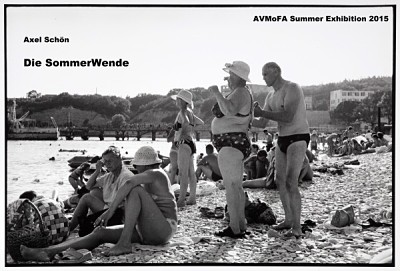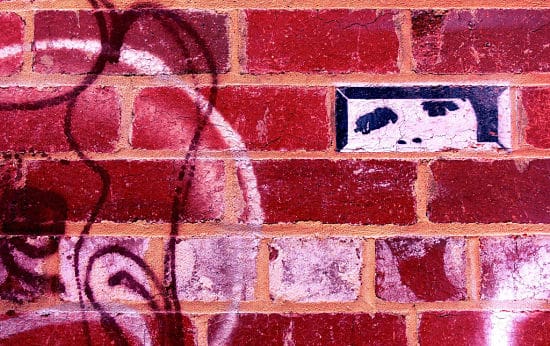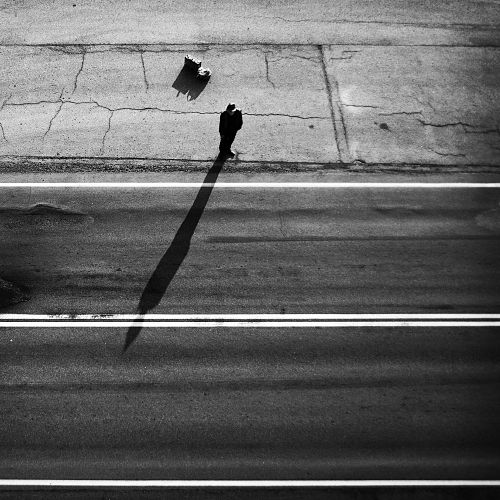Today we are very excited at Allegra – we continue our experimentation with serving you, dear readers, exotic and delicious slow food for thought. This time we created a menu for the upcoming two weeks with carefully selected ingredients to explore #postsocialism. And, above all, this is the first time we will introduce a new format – #AVMoFA Personal Exhibition.
For this thematic thread on postsocialism the keyword is BORDERS – walls, lines, marks that we cannot cross, do not dare to cross, prefer not to cross. Borders between states prescribe position in time and space to humans and non-humans alike. The inherent ‘border consciousness’ creates new categories related to border-crossings. People move and become migrants; objects move and become exported and smuggled goods. Borders within states are walls between people constructed by their origin, gender, age, class, profession, and habits. But all these borders are just a part of our social imagination, reinforced by routines and institutionalized to capture fleeting phenomena that make up the diversity ‘out there’, the spatial and temporal variability of life, so confusing and yet so thrilling.
During the past decades, the luxury of experiencing ‘summer’ as ‘vacation’ has become commonplace in the Western world. In summer, we tend to leave our habitual four walls – we go to the park, travel to the seaside, spend time outdoors in a summer cottage. When the sun shines warmly and ‘the livin’ is easy’, we open up to the world out there and set off to explore what’s behind the walls.
This summer, in the upcoming two weeks we will take you with us on a wonderful journey across four borders: art/science, performance/suspension, migration/refuge, dining/nutrition. We will explore the borderlines themselves as well as the realities they created in postsocialist space.
 On Tuesday (tomorrow), we will begin our curated weeks with AVMoFA’s first personal exhibition Die SommerWende. We will display 22 photographs by Axel Schön, an artist from Kiel (Germany), who traveled extensively across the former Soviet Union during the 1990-s and created a unique collection of images, deeply imprinted in the social imagination of the epoch that followed the Perestroika / die Wende in German / in the former Soviet Union. On Wednesday, Allegra #interview will further introduce Axel Schön as he explores walls, summer, and how the social transformation in socialist countries has affected his artistic works. This interview is inclusive of looking more in-depth at how the border between photography as an art form and photography as an ethnographic document can be defined – and whether there is one.
On Tuesday (tomorrow), we will begin our curated weeks with AVMoFA’s first personal exhibition Die SommerWende. We will display 22 photographs by Axel Schön, an artist from Kiel (Germany), who traveled extensively across the former Soviet Union during the 1990-s and created a unique collection of images, deeply imprinted in the social imagination of the epoch that followed the Perestroika / die Wende in German / in the former Soviet Union. On Wednesday, Allegra #interview will further introduce Axel Schön as he explores walls, summer, and how the social transformation in socialist countries has affected his artistic works. This interview is inclusive of looking more in-depth at how the border between photography as an art form and photography as an ethnographic document can be defined – and whether there is one.
On Thursday and Friday we will continue to expand boundaries and cross borderlines with two contributions by Judith Beyer from our archive. Simulacrum Crimea is a part of the Anthropoliteia virtual round table devoted to the Ukrainian crisis that was held by Allegra in April 2014. In this post Judith suggests to look at the Crimea events as performances – legal and political. Together with Judith we revisit the current positions on Crimea while examining Axel’s works that documented the Black Sea as a popular Soviet resort, a sentiment that has played a crucial role in positioning the Crimean annexation in the Russian media.
On Friday we will revisit the essay Russian and Polar Bears Unite! A follow up that first appeared on Allegra in February 2015 as a bijou textual and visual exploration of the bear in Russian folklore – both traditional, like fairytales, and current political, like internet memes. This essay can be seen as mirroring a sort of ‘A Midsummer Night’s Dream’, a phantasmagoric mixture of imagined and existing, when awakening, and thus realization and attribution of images and artifacts, delimit the border between a dream and a real experience.

The following week will continue with breaking walls and stereotypes. On Monday and Tuesday we will deal with migration, refugees, and materiality of border work. First, we offer you a piece by Magnus Marsden who pursued intensive ethnographic fieldwork in three ex-Soviet Union countries: Tajikistan, Ukraine, and Russia, to explore the activities of Afghan traders in the post-socialist space. His post draws attention to the intertwined nature of cross-border motilities as a combination of economic and political ‘push and pull’ factors, resulting in blurring the boundary between refugee and trader/economic migrant.
On Tuesday we continue with a review of Border Work: Spatial Lives of the State in Rural Central Asia by Madeleine Reeves (2014) prepared by Mateusz Laszczkowski. This reading of Reeves’ work stresses the exploration of borders as events as improvisations appear and disappear with certain human practices. The work invites us to give a new meaning to, by now, a routinized description of borders as ‘contested’ imaginations.
On Wednesday and Thursday we will move on to seeking to understand borders in another realm, between nutrition, dining tradition, ethics and culture. We begin with a brief reportage on a EASA 2014 panel, (Re)creating intimacy through food: searching for (post-)Soviet taste, presented by the panel’s convenor Agnese Bankovska.
On Thursday we will continue with Constanza Curro’s review of the chapters on post-Soviet Russia and Lithuania from Ethical Eating in the Postsocialist and Socialist World edited by Yung, Klein, and Caldwell. The review points out this edited volume’s emphasis on different attitudes of the socialist past has affected people’s perception and dispositions towards food practices and shaped peculiar constellations of state-market-citizen relations in the post-Soviet space.
Finally, on Friday we will conclude, wrap up, and look forward to where other walls might be falling next. This sophisticated menu we shall serve you over the next two weeks is not a mishmash with a cherry on top: adding daily ingredients allows us to show the complexity that connects borders, thus providing us new tastes or ways to think about it.
As our summer concludes with our thematic thread we would like to encourage you, dear readers, to think critically of each wall you encounter and reinvent the borders whenever necessary.





